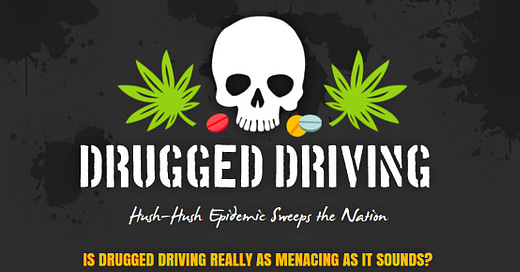DHS/NHTSA studies claim drunk driving is decreasing, claim drugged driving is increasing

Drunk driving has decreased by one-third since 2007 and three-quarters since 1973, according to the National Highway Traffic Safety Administration's (NHTSA) 2013-2014 Roadside Survey of Alcohol and Drug Use by Drivers. The NHTSA used FORCIBLY collected oral fluid or blood samples from 11,100 drivers at 60 locations across the country to make the determination .
If drunk driving is down, why is there an increase in illegal no-refusal blood draw checkpoints across the country?
DHS has partnered with the NHTSA, click here & here to read more.
NHTSA & DHS are providing police across the country 'No Refusal DUI' toolkits! Click here & here to find out more.
NHTSA's 2013 'Alcohol Impaired Driving' study shows drunk driving in America is has been declining for years!
"The alcohol-impaired-driving fatality rate in the past 10 years has declined by 23 percent, from 2004 - 2013."
Click here to read another study showing DWI arrests in America are declining.
Mothers Against Drunk Driving (MADD)has a close relationship with DHS, click here, here & here to read more.
If MADD/DHS have there way, they'll put breathalyzers in every vehicle.
DHS has been illegally detaining Americans near the border for years. An internal memo titled “Enforcement Options With Alcohol-Impaired Drivers” directs U.S. Border Patrol agents in the Tucson, Arizona sector to “release” individuals under the influence and “allow them to go on their way.”
The document acknowledges that this feels counter-intuitive for Border Patrol agents, but eases concerns by answering a hypothetical question for the officers who have sworn to uphold the law: “If you allow this driver to continue down the road and they kill someone, aren’t you liable?” The answer is no, according to the new Department of Homeland Security (DHS) memo. “There is no legal requirement for a Border Patrol agent to intervene in a state crime, including DUI,” the order says, adding that “therefore there is generally no liability that will attach to the agent or agency for failing to act in this situation.”
Think about that the next time you're pulled over or questioned by police. If DHS is running police departments across the country, they have no legal right to intervene i.e., stop a suspected drunk/drugged driver anywhere in the country!
Be wary of DHS/NHTSA's biased studies, their agenda is to increase illegal checkpoints and to B.S. the public into believing there's an epidemic of drugged (marijuana) impaired drivers across the country.
Last year I reported on a marijuana breathalyzer that's in development and why our rights are in jeopardy.
Last year, during a congressional hearing on the threat posed by stoned drivers, a representative of the NHTSA was asked how many crash fatalities are caused by marijuana each year. "That's difficult to say," replied Jeff Michael, NHTSA's associate administrator for research and program development. "We don't have a precise estimate." The most he was willing to affirm was that the number is "probably not" zero.
According to the NHTSA or should I say DHS, nearly one-quarter of drivers tested positive for at least one drug that could affect safety, according to the survey, which has been conducted five times during the last 40 years.
Drivers with evidence of drugs in their system on weekend nights climbed from 16.3 percent in 2007 to 20 percent in 2014, and those with marijuana in their system grew by nearly 50 percent during that same period.
Over all, drivers who tested positive for active THC were 25 percent more likely to be involved in crashes. But once the researchers took sex, age, and race/ethnicity into account, the risk ratio shrank from 1.25 to 1.05 and was no longer statistically significant:
This analysis shows that the significant increased risk of crash involvement associated with THC and illegal drugs…is not found after adjusting for these demographic variables. This finding suggests that these demographic variables may have co-varied with drug use and accounted for most of the increased crash risk. For example, if the THC-positive drivers were predominantly young males, their apparent crash risk may have been related to age and gender rather than use of THC.
A second study, the Crash Risk Study, found that marijuana use by drivers is associated with a greater risk of crashes, but the study notes that marijuana users are more likely to be in population segments (i.e. young males) that crash at higher rates regardless of drug use.
http://reason.com/archives/2015/02/16/drugged-drivers-who-aren't
Click on the link below to read the studies:
http://www.nhtsa.gov/Driving+Safety/Research+&+Evaluation/Alcohol+and+Drug+Use+By+Drivers


